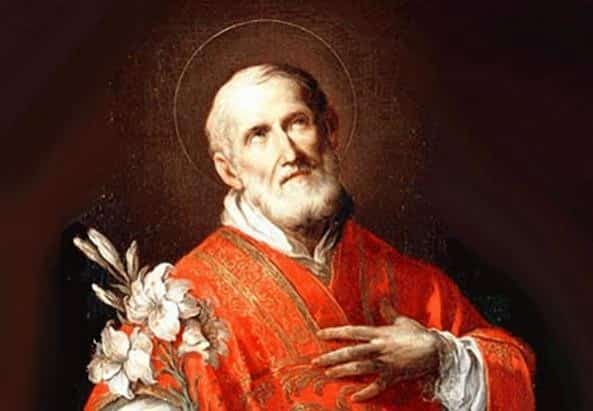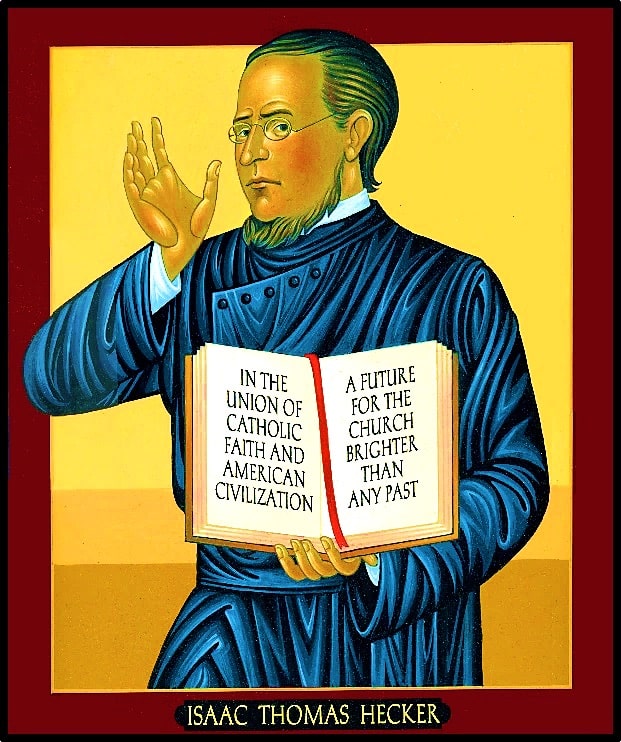June 3, 2020
Perfect for printing: Download this newsletter in PDF format
- Can Capitalism Save Itself?
- Poems by Paulist Tom Holahan, C.S.P.
- Looking for Newsletter Input
- Our Monthly Programs for Our 15 Paulist Patrons
- Proposed Program for June: Philip Neri
- Proposed Program for July: Mary Magdalene
- Renewing Promises and Updating Lists of Associates
- Paulist Associate News
- Prayer for the Intercession of Father Isaac T. Hecker
- Contacts
- Promise
Submitted by Frank DeSiano, C.S.P.
For most of my childhood this would have seemed a stupid question. After all, Capitalism stood directly against Communism, its vicious rival which had taken root not only in Russia and Asia, but, most ominously, in Europe as well. Communism was, at heart, atheistic, insisting that life and goods were finite, that people had to get what was due them right now and not in some future, celestial package. Capitalism, however, stood against that. Work hard, get ahead, and you might well get ahead in this life and, even more, have it all in the next life as well.
European Communism as a viable political system met its demise in the 1980s. Whatever humanistic values it espoused, it collapsed under its own rational presumptions. What kind of planning and control could really determine the needed distribution of goods and benefits? What price would all that supposed control exact from people whose lives were designed for greater spontaneity and freedom?
“Mr. Gorbachev, tear down this wall,” said Ronald Reagan. It fell of its own accord.
But Capitalism, in the various versions in which it has come to exist, has its own problems. I can think of four. First, it seems to inevitably produce economic bubbles that eventually burst, damaging people and corporations in the process. Second, it seems destined to produce income inequality. Third, it has no limits in terms of using earth’s resources. And, finally, it creates cultures that grow averse to having children and so eventually cannot reproduce themselves.
The cause behind all these issues is, paradoxically, the seriousness with which Capitalism takes itself: its lack of humility. By this I mean that the assumption of Capitalism, at least as practiced in the United States, is that money is its own purpose. Accumulating money, and the more the better, is what the economic system is all about. We have strangely produced a culture that, in the name of throwing out royalty, needs to produce its own version of royalty, figures buoyed by business or entertainment, who become fabulously rich, and perhaps glamorous and influential as well. The envy produced by this accumulation drives the fantasies of so many others even if they don’t have the slightest chance of approximating the success of the rich and famous.
Because money is the reason and purpose, Capitalism, in the first place, cannot stop bubbles from occurring. Bubbles, meaning the almost-irrational pursuit of more money with people chasing tulips, gold, or market offerings, inevitably burst. When markets go furiously up, they then go furiously down. So much of investing rests on a system of debts with people betting on future income in such a way that, once the system has doubts, it starts to eat itself. Markets depend on borrowing; once people no longer have the confidence to lend, markets stagger and collapse under their own uncertainty. A simple Google search for “economic depressions” confirms this sad, and seemingly inevitable, history.
Secondly, because capitalism as we espouse it rests on the principle that money is its own value, it is destined to produce inequality. In fact, a lot of capitalism seems predicated on inequality because it takes very rich people to start and sustain the economic process. The whole assumption of “trickle down,” about which Pope Francis has famously voiced skepticism, is that one needs very rich people to produce the business and jobs on which everyone else depends. If this was an implicit idea in past years, it has become something of a dogma in recent decades, one affirmed by the skewing of taxing policy to favor those who have more. The one part of the Gospel that Capitalism seems to favor is Jesus’ words, “to the one who has, more will be given, but the one who has not, even what he has will be taken away” (Matthew 13:12).
Inequality, if anything, as grown in recent history. Perhaps inequality might work if everyone, even those on the bottom, had plenty, and therefore had no need to envy those who are richer. But this belies the sense of injustice produced in almost all societies, underscored by riots or populist elections. If people are not getting ahead, they feel then that society is cheating them. Life is unfair; so is money.
Thirdly, because an unchecked accumulation of wealth drives the assumptions of today’s Capitalism, this necessarily involves an unchecked exploitation of what it takes to produce wealth. Even apart from climate change, the finite limits of the world, as Francis reminded us in Laudato Si’, cannot sustain unlimited exploitation. At some point, things run out or nature’s resources get poisoned.
Finally, because money is the point, it becomes more important than people. Perhaps this seems a bald and unfortunate way to say it, but the seemingly intractable declines in birth rates among developed capitalistic societies shows this quite clearly. Capitalism demands allegiance to progress; and progress insists on people getting higher degrees and professional credentials, all of which swing the time to have children away from a more natural age of twenty into a more pressured age of thirty. The result is a flat or negative birth rate. Societies may decry “all these foreigners” who come to our shore, but the bitter truth is that, without new blood and life in the form of immigrants, many societies would just self-eviscerate from old age.
Can anything be done to correct these almost inevitable distortions?
There are indeed mechanisms (or they can be developed) to offset some of these problems with Capitalism. Money, resources, and opportunity can be more evenly distributed, for example. The invention of the public-school system in the United States clearly was, and is, an attempt to equalize the opportunities people face. And we do hear periodic calls for even more progressive taxation, with people at the top potentially subject to being taxed at rates considerably above those who make much less. While these are possible, the demon of envy will always lurk, sometimes in a paradoxical way with even the wealthy resenting the progress that poorer people make.
One mechanism yet to be developed is the proper prizing of marriage, pregnancy, and childbirth. Since the 1980s it’s been a virtual orthodoxy that women belong in the workplace, and that they can and should compete right alongside men. This argument usually revolves around talent and gumption, but it ignores the basic biological reality that women, uniquely, can conceive children; and that this ability means that they must function in the workplace very differently than men. For decades the crucial question to women has been the fraught choice between a career and a family. (We can leave aside the implicit pressure this notion plays when people feel they have to resort to abortions.) When women answer this question on the side of their careers then modern society applauds them.
This, on its face, is nonsense, borne out by the inevitable inability of a population to reproduce itself. Capitalism, and its policy makers, need to carve out a prized place for the possibility of women and men to be parents. The birth of children – and the process of caring for them — needs to become as crucial in public thinking as available money, natural resources, means of transportation, and all the other factors we think makes modern society work. This issue comes down to what is absolutely necessary in order to have a viable population. Overpopulation might be dangled as an existential scare in societies with billions of people. But that’s not the issue with most developed countries. Capitalism needs children if only to have customers!
How can Capitalism tame its own “irrational exuberance,” to quote Alan Greenspan, a famous economist who watched an economy come to a boil in the 1980s? This involves a profound conversion, one which challenges the very elixir on which Capitalism is built. Society needs to come to see that money is not its own purpose but a function of relationships within a wider society. The relationships, and the people who have them, need to be valued above the economic activity they produce. In this conversion, Capitalism is not exclusively concerned with money and markets. Rather, it’s primarily concerned with people, and to ensuring that all people have enough money to keep the economy circulating for the good of everyone.
Is Capitalism capable of any humility like this? Is it possible for money to affirm its relative role and not be the be-all and end-all that we have made it? Are rich people capable of being less rich, and less ostentatious, and more society-driven than Capitalistic thinking wants them to be? Surely, we have the generosity of people like Bill Gates, Mike Bloomberg, Oprah Winfrey, and Jeff Bezos; but we expect people who are shamefully rich to do more than sit in their piles of cash. Humility has to insinuate itself in the ideals of all leaders—bosses, executives, politicians, board room gurus, pastors, stars, and sports heroes—who must come to see, and to live, the reality that these folks just do not always need more money; a few million dollars and several houses do not demand more millions and more houses.
Unfortunately, such a conversion is not likely to come from Capitalism itself. Here other values, must come into play, especially the values of faith (when it is not polluted by prosperity-gospel nonsense) to reveal the interconnectedness of everything, to point out the essential truth that no one lives for him- or herself, that each one must live, selflessly, for the other. Pope Francis points to the crucial value of the “common home” that we have; to choose policies that do not lead to its destruction inevitably drives us to values greater than acquisition and accumulation.
As many have noted, including Paulist founder Fr. Isaac Hecker, democracy without faith tends to be distorted. As do its economic systems. The salvation of Capitalism entails a humbler but broader vision of the relative role of money grounded on the absolute good of a fuller life for all. A Gospel vision attuned to the common good, framed by belief in a generous God who calls us all beyond unchecked greed, might be the only way for Capitalism to find some kind of salvation.
Virus Flower
Lighter than discarded husks
of buds and floating farther
this vital dust spreads with
the carpet of flowers falling at my feet,
white blossoms I never bothered to name
become poignant this year
of virus and spring.
14 Mar 2020
On Taking the Sun in a Time of Plague
Seven stories up
an expanse of sun arrives
now at two,
drifting earlier each celestial
day, raising my mind from
worry to astronomy.
The usual chaos of the street
departed, a bird chirps hesitantly
from its new perch,
a honey bee tumbles on the slate,
dizzy but alive.
19 April 2020

The Newsletter is published monthly, except January and July. The January monthly Program appears in the December issue, the July Program in the June issue. Articles should be submitted at least a week before the end of the month to appear in the new month.
Material for Associates World is always welcome. We would love to hear what is going on with your local organization. If you have material for the newsletter please contact Denis Hurley <[email protected]>.
Submitted by Fr. Mike Kallock, C.S.P.
We have now finished or have scheduled all of our 15 patrons saint, with one surprising exception – The Blessed Immaculate Virgin Mary.
The “Blessed and Immaculate Virgin Mary,” is so named and is first on the list of the first seven Paulist patrons in the 1874 Paulist Fathers Constitution. She was declared patroness of the United States in 1846.
If you would like to do the Program for the Immaculate Virgin Mary for the January 2021 issue, please email me at [email protected]. Below with this June Newsletter is the remaining schedule
.
| Schedule of Our Monthly Proprosed Programs for our 15 Paulist Patrons | |||
|
Aug |
Elizabeth Seton – Los Angeles |
Dec |
Thomas Aquinas – Knoxville |
|
Sep |
Thomas Aquinas – Knoxville |
Jan |
The Blessed Immaculate Virgin Mary – ??? |
|
Oct |
John Henry Newman – Columbu |
Feb |
Alphonsus Liguori – Mike Kallock, CSP |
|
Nov |
John XXIII – West Michigan |
Mar |
Patrick – Rome |
Submitted by Toronto Associate, Filomena Melo

Gracious God, we honor your servant Philip Neri. We pray that we may be inflamed by the same fire of the Holy Spirit, which burned in his heart. We ask this in the name of Jesus Christ, who lives and reigns with you and the Holy Spirit, one God, for ever and ever. Amen.
(from the May 26 Memorial Mass for Philip Neri)
Read in advance of meeting:
Philip Neri was born in Florence in 1515. He had a docile, merry disposition. They called him “Pippo buono,” “good little Phil,” for he was a dutiful, attractive, cheerful lad, popular with all who knew him. At eighteen Philip had a mystical experience in which he spoke of as his “conversion,” that radically changed his life.
He was particularly interested in the young. He had a knack for seizing on opportunities for engaging in conversation and lead others to a better way of life. His warm friendliness and lively sense of humor would quickly catch the attention of passersby, and once caught, they found it difficult to break away. His customary question, “Well, brothers, when shall we begin to do good?”
By the time he was thirty-four, Philip had accomplished a great deal. His humility made him shrink from taking Holy Orders, but at last, on May 23, 1551, he was ordained. He carried on his mission mainly through the confessional. Starting before daybreak and continuing hour after hour, he sat in the tribunal of penance, while men and women of all ages and ranks flocked to him.
He is known as one of the outstanding mystics during the Counter-Reformation and founder of the Congregation of the Oratory (now the Institute of the Oratory of St. Philip Neri, also called Oratorians), a congregation of secular priests and clerics. Also known as the Third Apostle of Rome, after Saints Peter and Paul. On the Feast of Corpus Christi, May 25, 1595, after a day of hearing confessions, Philip passed. His last words were, “Last of all, we must die.”
Share your favorite quote below from Philip Neri and what it means to you:
- “Do not grieve over the temptations you suffer. When the Lord intends to bestow a particular virtue on us, He often permits us first to be tempted by the opposite vice. Therefore, look upon every temptation as an invitation to grow in a particular virtue and a promise by God that you will be successful, if only you stand fast.”
- “The best way to prepare for death is to spend every day of life as though it were the last.”
- “The cross is the gift God gives to his friends.”
- “Believe me, there is no more powerful means to obtain God’s grace than to employ the intercessions of the Holy Virgin.”
- “The greatness of our love of God must be tested by the desire we have of suffering for His love.”
- “To preserve our cheerfulness amid sicknesses and troubles, is a sign of a right and good spirit.”
News/Announcements/Prayers for Others:
Closing Prayer:
Glorious Saint Paul,
Most zealous apostle,
Martyr for the love of Christ,
Give us a deep faith,
A steadfast hope,
A burning love for our Lord,
So that we can proclaim with you,
‘It is no longer I who live,
But Christ who lives in me.
Submitted by Mary Sullivan Board Member and Boston Associate:

Almighty, ever living God,
Mary Magdalene was the first
to receive the good news of Easter joy from the risen Christ.
May we eagerly bear the good news to all those we meet.
We pray this in the name and the power of Jesus Christ, our savior and redeemer.
(from Memorial of St. Mary Magdalene July 22 – Paulist Prayer Book)
Read in advance of meeting:
Dorothy Day, co-founder of The Catholic Worker movement, was famously quoted as saying, “When they call you a saint, it means basically that you are not to be taken seriously.” Many of you may be familiar with the often-paraphrased quote as “Don’t call me a saint”.
Many of you also may be familiar with the (albeit fading) perception that Mary of Magdala was a reformed prostitute based on an unfortunate juxtaposition of Gospel passages. I suggest that it’s not too much of a stretch to imagine Mary of Magdala voicing a strong “You Go, Girl!” to Dorothy Day’s hearing every now and then.
In an article appearing in the April, 2000 issue of “US Catholic”, Heidi Schlumpf writes that “Unlike other women in the Bible, Mary of Magdala is not identified in relation to another person; she is not anyone’s mother, wife, or sister. Instead, she is called Mary of Magdala, a title that implies some prominence in the city, a center of commercial fishing on the northwest bank of the Sea of Galilee. She left her home to follow Jesus, and it is believed she was among several well-off, independent women who financially supported Jesus’ ministry”.
Mary Magdalene decided, at some point in her life, to shift direction in a visible way. Mary’s knowledge and support of Jesus during his life, her presence (at great risk) at his death and singular witness at the tomb after the Resurrection likely filled her with the inner fire needed to rise up within the group of (mostly male) disciples and apostles.
As first to bear witness to the Risen Lord, Mary would become known in the early church as “The Apostle to the Apostles!” Mary proved to be a strong, attractive, intelligent, and capable Evangelist. She did not wait to be asked to lead – she just led.
Yet, Mary of Magdala has often been dismissed and misunderstood as a sinner and prostitute, in a reverse way to Dorothy Day’s fear that being labeled a saint would render her irrelevant. Perhaps being misunderstood by others does not really matter. What matters is that we and the Holy Spirit understand each other.
Discussion Questions to Share in Your Group:
- Mary of Magdala, who lived 2,000 years ago, is one of the few saints who have been known and revered over much of that time. Why do you think that is so?
- Think about sometimes in your life when you felt seriously misunderstood. Was it important to set people straight – or did you find it humorous – or did it not really matter?
- Mary felt it was important to go to the tomb. Do you find comfort in going to visit the graves of people you love? Why or why not?
News/Announcements/Prayers for Others:
Closing Prayer:
Mary of Magdala
Woman at the tomb
You did not yet know what awaited you
But felt confusion, doubt, and loss.
Pray for those whose feelings you so well understand.
Guide us through your story to the hope of the Resurrection.
We are always happy to hear about new Associates taking promises as well as current Paulists renewing theirs. Please post notices and photos on Facebook and let us know so we can add the information in this newsletter.
When these renewals take place, it would be helpful to all if the local coordinator would send an updated list of Associates to Kathleen Lossau so she can keep our contact list current. Please email contact information for those taking first promises and those renewing promises as well as a list of those who have opted not to renewing promises to Kathleen Lossau <[email protected]>.
At our first online meeting of the coordinators of our associate groups it was decided, given the concerns for everyone’s safety during the pandemic, that our regional retreat in the Austin, TX area on Oct 15-18 be cancelled.
We thank and deeply appreciate the willingness, effort, and time our Austin and Horseshoe Bay Associates had already put into hosting this event.
This extraordinary time is calling us to be more creative and resourceful in our fostering, strengthening, and nourishing our Paulist Associates. So, all is not lost.
We are instead starting to plan for a virtual retreat. It cannot replace the social interaction and intimacy of a physical retreat. But virtual, online gatherings are growing in popularity and can conveniently bring more of us together.
The virtual retreat will still have the theme Spirit in America: Encountering God Today. It will be based on the pilot retreat of the Paulists Hecker Spirituality Retreat Committee.
We will have more details next month and are still shooting for a mid-October date.
Kudos to Boston Associate and Board member, Mary Sullivan for calling together and hosting our first coordinators online meeting. Nine of associate groups were represented.
Mike Kallock, CSP

Look upon us this day, with compassion and hope. Hear our prayer. We ask that through the intercession of Father Hecker your servant, you might grant us (state the request).
We ask this in the name of Jesus Christ, Your Son, Our Lord, who lives and reigns with You and the Holy Spirit. One God, forever and ever. Amen.
When you pray this prayer, and if you believe that you have received any favors through Hecker’s intercession, please contact the Office of the Cause for Canonization of Servant of God, Isaac Hecker at [email protected]. Visit the web site: isaachecker.org to learn more about his life and the cause for his canonization.
Paulist Associates National Director
Mike Kallock, CSP
Paulist General Office
New York, NY 10023
Board Members
Carol Wagner Williams
Tuscon, AZ
Frank Desiderio, C.S.P.
Katherine Murphy Mertzlufft
Columbus, OH
Joe Scott, CSP
David Rooney
Chicago, IL
Mary Sullivan
Boston, MA
I believe that I am drawn by the Holy Spirit to the spirituality and qualities of the Paulist Community. I have discerned both by prayer and study that God calls me to become associated with the Paulists. I promise that I will pray for the works of the Paulist Society, meet with others, who are also members of the Paulist Associates, for spiritual sharing and formation; and I seek to embody the apostolic qualities of the Paulists in my daily life.
Attentive to the Holy Spirit and faithful to the example of St. Paul and the charism of Father Isaac Hecker, I commit myself for one year of membership in the Paulist Associates.
